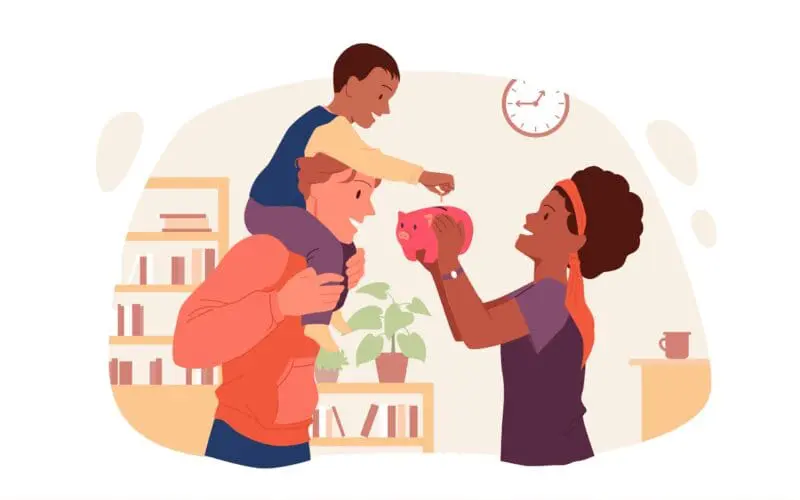
Credit plays a key role in today’s society. It’s what allows us to successfully apply for credit cards, rent apartments, buy houses and cars, set up insurance and utilities, and even apply for jobs. Financially independent young adults often rely on their credit to get their lives started. But with 18 being the minimum age to apply for a credit card, this leaves only a few years for young adults to build credit before they are on their own.
So, how can we, as parents, set our children up for financial success and alleviate the stress of building good credit? Let’s start by discussing the importance of having good credit.
What Is Credit?
Credit is the act of borrowing money with the understanding that you will pay it back later with interest. A credit score is a numerical value that defines your creditworthiness. This score is based on your payment history, the diversity of your credit, the timeliness of your payments, your credit utilization ratio, and more. Credit is built through fixed-term loans, revolving credit lines, variable interest rate loans, and other borrowing arrangements.
Credit scores typically fall between 400 to 900. The higher your credit score, the better your credit. A lower score places you in the subprime borrower category, meaning you pose a higher risk to lenders. Timely payments, how much you rely on credit, how long your accounts have been open, and the mix of your credit all play a role in your credit score.
A bad credit score can make it hard to get on your feet. You may experience rejection from landlords. You may only have access to prepaid and low-quality wireless plans. You may have high homeowners and vehicle insurance premiums. And you may experience career setbacks due to failed background checks.
Your children could experience these consequences — and more — without a good credit score. Let’s look at a few simple ways to invest in your children’s future by assisting them in building good credit.
Start Early
Studies have shown that children develop money behaviors as early as three years old, and these behaviors are nearly solidified by the time they’re seven. Even at a very young age, your children are watching the way that you use money and are subconsciously molding their own views after what they see you do. To create good money habits early on, give your children incentives to earn money rather than simply giving it to them. For example, you can give them a weekly or monthly allowance if they complete chores around the house. Cementing these habits early on instills good financial habits for the future.
As your children continue to grow, teach them “money basics”. Emphasize the importance of paying bills on time. Teach them to spend below their means. Encourage your children to buy only things they can afford, and they will carry those habits into adulthood. Lastly, teach them never to open more accounts than they can manage. It seems that most stores these days offer you a new credit card at checkout in exchange for a discount. Tell your children that it’s okay to turn those offers down. Your kids should be selective about the amount and types of credit cards they use.
Teach the Difference Between Debit and Credit Cards
Kids can easily make the association that one swipe of a plastic card allows their parents to buy things, but it’s crucial to teach them that not all cards are the same. Debit cards are like using cash, but credit cards use borrowed money and must eventually be paid off with real money. This is a good thing to tell your kids so that they do not overspend in the future or rack up a ton of credit card debt.
Explain to your kids the payment process for credit cards. Helping them understand the process of borrowing money using a credit card and paying it back on time will help them be responsible credit card users. Credit card abuse is one of the most common causes of credit trouble, so teaching responsible credit card practices early will benefit your children in the long run.
Open Checking and Savings Accounts in Your Child’s Name
While checking and savings accounts won’t directly affect your child’s credit, they will teach them good money practices. Before your child is able to borrow money responsibly, they should know the fundamentals of depositing and withdrawing their own funds.
With a debit card, your child is only able to spend money they already have in their account. They will be responsible for keeping track of their funds and spending to make sure they don’t overdraw on the account. Debit cards teach children to be mindful of how much they spend. Responsible debit card use teaches children how to practice good credit card use.
Add Your Kid as an Authorized User of Your Credit Card
You can help your child build credit before they turn 18 by making them an authorized user of your credit card. Many cards require a new user to be at least 13-15 years of age, but some have no minimum age requirement. With this authorization, your child can use the card independently, and you can use it as an opportunity to teach them when to use a credit card and the importance of paying their monthly credit card bill. It’s important to note that adding your child as an authorized user to your credit card can also negatively impact their — and your — credit score if the card is not used responsibly. Keep a close eye on the card usage and pay the entire balance monthly if possible.
It’s also important to set some ground rules when you make your child an authorized user. Authorized users don’t pay the card issuer. Instead, your child will pay you, and you’ll be responsible for paying the bill. You might want your child to pay you the full amount they owe each month. You also may want to make certain purchases off-limit or create a maximum spending limit. And if you’re able, you can work out a pay-over-time fallback plan if your child makes a big purchase and needs to make smaller payments towards it. Making your child an authorized user of your credit card is meant to help them learn by doing, not take advantage of having a credit card. Setting ground rules will ensure that it’s a learning experience for your child.
Ultimately, your child doesn’t need a physical card to become an authorized user. If you and your child are ready to start building their credit and the issuer allows you to add them as a user, you can start at any point. Here are some signs that your child is credit-ready:
- You want your child to have a credit card in case of emergencies. This typically happens around the time that children start driving.
- Your child demonstrates interest in building their credit.
- Your child can budget, save, and spend money wisely.
- Your child is honest and willing to ask questions when they don’t understand certain aspects of money management.
- Your child has demonstrated maturity and the ability to control impulses.
Making your child an authorized user of your credit card is a great way to start building their credit before they turn 18. However, you should confirm that their user activity will be reported to credit bureaus. Your child’s status as an authorized user won’t help build their credit score if it’s not reported.
Co-sign on a Credit Card or a Loan
If you have an older teenager who's buying their first car or who you trust to make regular payments, consider co-signing on a card or a loan with them. When children co-sign on credit cards or loans, they are responsible for making the payments. While this practice teaches accountability and responsibility, it can be risky for parents. Make sure you trust your child to be responsible with a co-signed credit card before you agree to attach your name to their credit. Otherwise, your credit score can go down.
Co-signed credit cards and loans help your kids get their foot in the door of the credit world as they turn 18.
Ultimately, it takes a concerted effort by you and your child to help them enter adulthood with good credit. For more advice on how to help your kids build credit, talk to a Spero member advisor today or visit us at one of our convenient branch locations!



